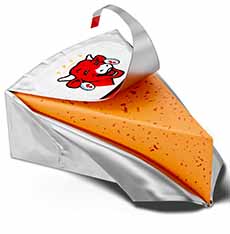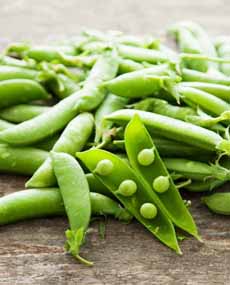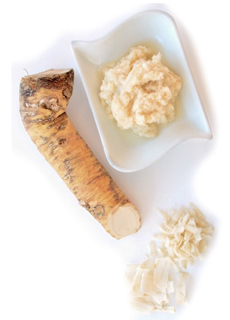Different Types Of Onions
A Glossary Of Onion Types & Which Onion To Choose For Cooking
|
CAPSULE REPORT:
When should you use which type of onion? Onions come in all shapes and sizes and a variety of colors, and their textures and flavors can be quite different. Different types of onions can’t necessarily be substituted for one another. So how do you know which onions are best for which dishes? From French onion soup to succotash, the onion varietal you use does matter! To help get your onions in order, take a look at the most common ones: brown onions, green onions (scallions), leeks, pearl onions, red onions, shallots and yellow onions, among others. Like learning about food? See our many other food glossaries.
Introduction To Onions
Onions range in size from tiny—less than one-inch in diameter—to jumbo—more than 4.5-inches in diameter. Onions are also seasonal, divided into two categories, although imported onions make most types available year-long. Yellow, white and red onions are available in both categories.
- Spring/Summer Onions (March through August) With thin, lighter-colored skin, these onions are typically higher in water content, which reduces their shelf life. These are more delicate onions, range in flavor from sweet to mild. They are popularly used in salads, sandwiches, and lightly-cooked dishes.
- Fall/Winter Onions (August through May) These onions have multiple layers of thick, darker colored skin, are typically lower in water content, and thus have a longer shelf-life. These are heartier onions, ranging in flavor from mild to pungent. They are popularly used for savory dishes that require longer cooking times and/or more flavor.
Onions belong to the Allium genus, that includes hundreds of species including all varieties of cultivated onion, garlic, scallion, shallot, leek and chives. Onions grow the world over; often, different countries have different names for the same subspecies. The following are varieties commonly found in the U.S.
Bermuda Onions
See red onions.
Cipollini Onions
These small white onions look as if they were somehow flattened. They will surprise you with their sweetness. These spring/summer onions have a higher water content and are slightly sweeter than conventional onions. You may also find red cipollinis at farmers markets and specialty stores.
|
Green Onions or Scallions
Also known as scallions, this long, thin varietal is commonly found in Asian cuisine. Green onions are mild and need little to no cooking time. You can cook with the entire stalk if you wish: the white lower portion as well as the green leaves. We prefer to slice the leaves thin, on the bias, for a garnish on whatever it is you’re cooking. Bear in mind that if a recipe calls for “minced green onions,” it does not necessarily require you to truly mince them to smithereens, as you would with garlic. Slicing very thin rings will almost always suffice in a recipe, and it preserves the integrity of the onion’s shape, adding a bit of visual appeal.
|
|
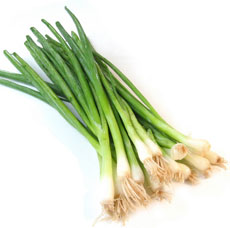
Green onions. Photo courtesy PachD.com. |
Leeks
Though they look like jumbo scallions, leeks are actually quite different, and heartier. They are typically best sweated or sautéed, and leeks can add body to a soup, stew, or other recipe that their smaller relatives cannot. Clean them well though; leeks grow in sandy soils and have open stalks, so they collect a lot of sand between their layers. Here’s a great way to clean leeks:
- Chop off the root end, as well as the stalk where it begins to turn green and get tough.
- Split the cylinder that remains down the middle, halving the leek lengthwise.
- Slice as you would a green onion, yielding half-rings.
- Soak the pieces in a large bowl of cold water for a few minutes, agitating the leeks, then remove in large handfuls, shaking out the excess water, and place in a colander to dry. You should see bit of sand at the bottom of the bowl.
|
|
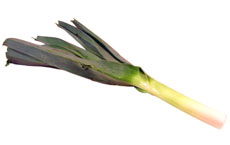
Green onions. Photo courtesy PachD.com. |
Maui Onions
See sweet onions.
Pearl Onions
Also known as Button or Baby onions, these adorable little guys are relatively mild and have a unique and appealing look. This makes them ideal for a dish like succotash, or perhaps a stew: anywhere you will be able to show them off nestled among other vegetable pieces of a similar size. If you cook them whole, they have a pleasant texture when they burst sweetness in your mouth.
|
|
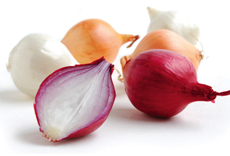
Don’t let the photo fool you: These are itty, bitty onions. Photo courtesy Melissas.com.
|
Ramps
Ramps are wild leeks, available for a few fleeting weeks each year. They are also known as ramson, wild garlic and wood leeks. In French, they are called ail des bois, garlic of the woods, as they pop up in patches in wooded areas of the eastern U.S. Some can scatter and grow at the edges of fields and yards. The flavor is a combination of green onions (scallions) and garlic. Here are recipes for a ramp omelet and pickled ramps, plus more about ramps in general.
|
|
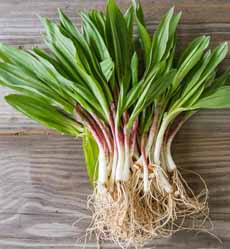
Ramps. Photo courtesy GoodEggs.com. |
Red Onions or Bermuda Onions
Typically the next most common onion at the market, red onions actually contain less sugar than their yellow and white brothers. Because of this, they are a no-no for caramelizing. This is not to say you can’t caramelize them, but the result will not be as sweet as with the yellow or white onions. Red onions, however, stand up surprisingly well when grilled, especially when sliced into thick rings. Simply brush them with oil, sprinkle with salt and pepper, and cook them for 3-5 minutes on each side. They’re a great addition to summer salads!
Scallions
See green onions.
|
|
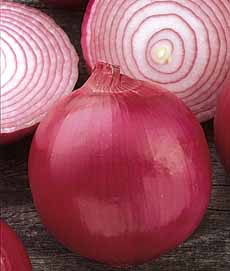
Red onions add color to salads and other dishes. Photo by Lali Masriera | Wikimedia. |
Shallots
Shallots are a sweeter member of the onion family, and are ubiquitous in French cuisine (i.e., the onion of choice). Their ideal use, however, is in place of their larger, more common cousins if a sauce or dish is on the delicate side. Cooking halibut with a beurre blanc sauce, for example, would be the perfect place to use shallots. Making green bean casserole for the holidays? Try topping it with crispy shallots for a touch of refinement!
|
|
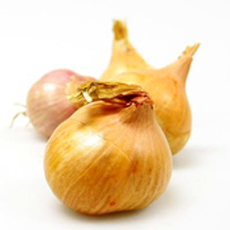
Shallots. Photo by Lali Masriera | Wikimedia. |
Spanish Onions
Spanish onions are a variety kind of?yellow onion?and we find them to be slightly sweeter and more delicate in flavor.
Spring Onions
Spring onions look similar to scallions, the latter also called green onions. So it’s easy to confuse spring onions and green onions. Sometimes the easy way to tell them apart is from the bulbs: If the ends are very bulbous, it’s a spring onion. But some varieties, like the one in the photo, have smaller bulbs. Part of the confusion is that spring onions are planted as seedlings in the late fall and then harvested the next spring; hence the name. Another source of confusion: In the U.K. countries, including Canada, spring onions are called green onions! Spring onion varieties include all-white bulbs; all-purple (called red) bulbs, as in the bottom photo; and a cross of the two, as in the top photo. The flavors and textures of these onion siblings are similar, so you can substitute one for the other in cooking. But for raw garnishes and crudités, keep in mind that the bulb portion of spring onions is milder than green onions, but the green tops are more intense. Both are members of the same species and genus, Allium fistulosum, but are different subspecies.
|
|
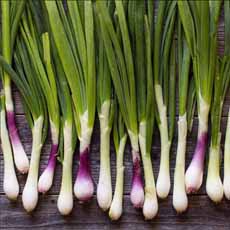
Above: Spring onions. Photo courtesy Sun Basket. Below: Bulbous, purple spring onions. Photo courtesy Good Eggs.
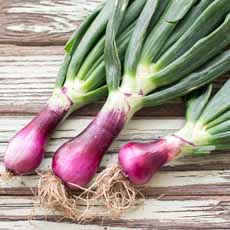 |
Sweet Onions
Maui, Vidalia and Walla Walla onions are sweet onion varieties named after the areas in which they’re grown. While previously available only during spring and summer, they are now more widely available.
|
|
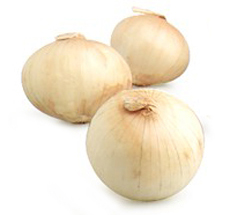
Sweet onions. Photo courtesy PachD. |
White Onions
Although they comprise only 5% of U.S. onion harvest, white onions are an all-purpose onion. They are commonly used in white sauces, pasta salad, potato salad, and in Mexican and Southwestern cuisine. But they’re an all-purpose onion, and they work in any recipe that calls for onions. They are a best bet when sweating onions or sautéing them for a sauce or stew. If a recipe does not specify what kind of onions to use, you’re always safe going with white. However, as a spring/summer onion, white onions do not have as long a shelf life as other varieties.
|
|
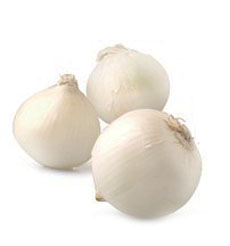
White onions. Photo courtesy PachD. |
Yellow Onions or Brown Onions
These popular, all-purpose onions comprise 87% of the U.S. onion crop. The best type of onion for caramelizing, cooking brings out this variety’s nutty, mellow, often sweet, quality. Also referred to as Brown Onions, these are probably equally as common as the white varietal. They function in almost exactly the same way, with one exception: Many cooks contend that yellow onions are best for caramelizing, and as such are called for in many classical French recipes. (However, this may very well be due to the fact that they were simply the most abundant when France was establishing itself as a culinary heavyweight.)
|
|
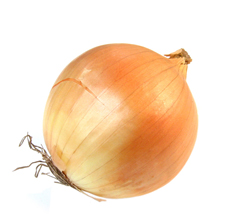
The all-purpose yellow onion. Photo courtesy PachD. |
|















